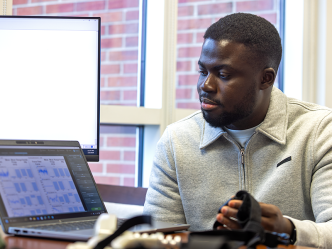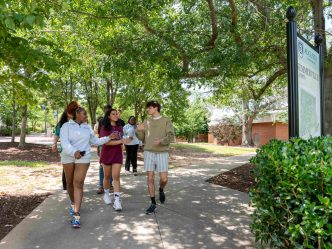The Cyber Institute and the Master of Public Administration program are partnering to analyze the cyber workforce needs of the Augusta metropolitan area
AUGUSTA, Ga. – As the Augusta area gets ready for the cyber tsunami that will soon hit the region, the Augusta University Cyber Institute and the Master of Public Administration are gearing up to study the wave of cyber jobs that will come with it.
Funded by the Cyber Institute, the study will collect and analyze data including how many cyber and information technology jobs will be available in the Augusta metropolitan area in the next few years, what the average salary for those positions will be, and what skills those jobs will require.
“This cyber phenomenon will significantly impact the local workforce and economy. In our study, which is the first of its kind in our region, we are specifically looking at how the local cyber workforce will be affected,” said Dr. William Hatcher, director of the MPA program at Augusta University and one of the researchers conducting the study. “By understanding how many jobs this cyber tsunami will create and what skills they will require, we can better calculate the economic impact of this phenomenon in our community.”
In 2016, cyber related jobs in the Augusta metropolitan area comprised 2,880 or 1.4 percent of the total estimated employment, excluding the military. The average salary for a cyber position was almost $76,500. With employment numbers from Fort Gordon, the number of cyber jobs increased to 12,716 or over 5.3 percent of the total workforce in the area. A staggering 38 percent of Fort Gordon jobs were directly related to cybersecurity.
To collect the new data, researchers from the Cyber Institute and the MPA program recently sent out a survey to local businesses, public agencies and nonprofits to better understand what the cyber workforce will look like in the near future. Once they receive the results of the survey, they will analyze the findings and write a report that will be available to the public in June.
“As an educational and research institution, it’s our duty to not only train our students for the real world but also engage and help our community,” said Dr. Mark Harris, Hull College of Business assistant professor of information technology and cybersecurity and one of the researchers working on this study. “On the one hand, we are helping local employers save money with training as we will use this data to understand their needs and train our students accordingly. On the other hand, we are better preparing our students for their first jobs, which will hopefully be in the Augusta area.”
[table id=2 /]
 Augusta University
Augusta University




